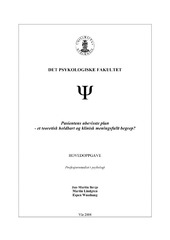Pasientens ubevisste plan - et teoretisk holdbart og klinisk meningsfullt begrep?
Master thesis
Permanent lenke
https://hdl.handle.net/1956/2894Utgivelsesdato
2008Metadata
Vis full innførselSamlinger
- Faculty of Psychology [535]
Sammendrag
The assumption that patients enter therapy with an unconscious plan puts Control-Mastery theory in a unique position with in psychodynamic theory. This paper discusses to what extent and in what way the plan concept is theoretically sound and clinically meaningful. The paper aims to address the foundation principles of the theory and how it applies to the plan concept. First, we examine and discuss how a plan" for the psychic healing process can be understood as unconscious. By integrating Zeddies` concept of the relational unconscious" and Stolorowand Atwood's "three realms of the unconscious", we claim that these perspectives can contribute to a greater depth in Control-Mastery's view of the unconscious. We conclude that the unconscious within Control-Mastery theory can be viewed as relational, fluid and contextualised. Then we explore the foundations for an unconscious plan. We argue that adaptation and relation seeking are strong motivational factors. In the last section, we discuss how the clinical implications of the planconcept relate to the theorizings of Rogers, Bohart, and Mitchell.We conclude in this paper that the plan concept is a significant contribution to psychodynamic theory, particularly its empirical support and its implications for both past, present, and future in the therapeutic encounter. Antagelsen om at pasienten kommer til terapi med en ubevisstplan setter kontroll-mestringsteori i en særstilling innen psykodynamisk teori. I oppgaven diskuterer vi i hvilken grad ogpå hvilken måte begrepet og antagelsen om en "ubevisst plan" er teoretisk holdbar og klinisk meningsfull. Vi søker å redegjøre forpremissene og antagelsene i kontroll-mestringsteori som ligger til grunn for planbegrepet. Først presenteres teorien og dens empiriske støtte, deretter undersøkes og diskuteres hvordan en "plan" for den psykiske helingsprosessen kan sies å væreubevisst. Ved å benytte Zeddies` konsept om det "relasjonelleubevisste "og Stolorow og Atwoods "tre domener av det ubevisste" hevder vi at disse teoretikerne kan tilføre kontroll-mestringsteori teoretisk dybde i synet på det ubevisste som relasjonelt, flytende og kontekstualisert. Videre gjøres det rede for hvilke grunnantagelser om menneskelig motivasjon som ligger til grunn for antagelsen om en "ubevisst plan". Vi argumenterer for at tilpasning, i tillegg til relasjonell kontakt er sentrale motivasjonsfaktorer. Til sist drøftes styrker og begrensninger planbegrepet har for den terapeutiske samhandling. Her belyses begrepet i forhold til Rogers, Bohart og Mitchell sine psykoterapiteorier. Vi argumenterer for at planbegrepet er et betydningsfullt bidrag innen psykodynamisk teori. En særlig styrke er dets empiriske støtte og perspektiv på både fortid, nåtid og fremtid i den terapeutiske samhandling.
Utgiver
The University of BergenOpphavsrett
Copyright the author. All rights reservedThe author
